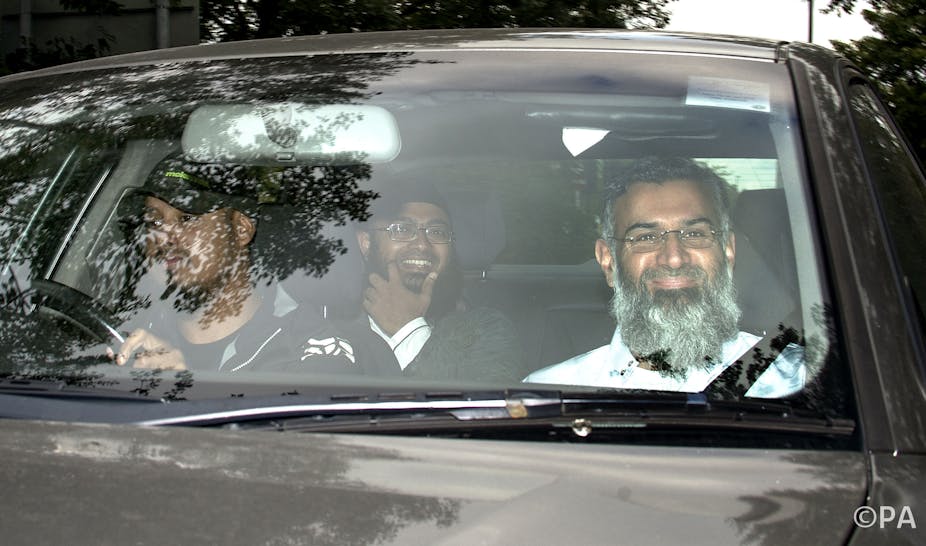The recent conviction of Anjem Choudary for inviting support for Islamic State triggered a broader reflection on the role of the media in creating a public platform for this dangerous demagogue. The Daily Telegraph raised questions about why Choudary was so often invited to appear in the mainstream media (most notably the BBC) to espouse his extreme views.
During the trial it was revealed that Choudary would “bait” his contacts in the media with tip-offs about his next demonstration or publicity stunt. Others, such as the Muslim Council of Britain, are questioning why Choudary was chosen when he has such little support and is so clearly unrepresentative of mainstream Muslim opinion.
Wisdom in hindsight is not unusual, but it ignores the serious and ongoing relationship of mutual dependency that has developed between figures such as Choudary and the media – a relationship that extends beyond broadcasting to take in the press too. He has shown considerable acumen in “playing” a media that, in turn, has shown more than a willingness to be played. Choudary is projected as an authentic (albeit extreme) voice of the aggrieved Muslim, and his appearance guarantees controversy, viewers or a likely circulation boost.
In addition to being called on by BBC Newsnight to comment on the Lee Rigby murder in 2013, Choudary also appeared on several other occasions – to laud British suicide bombers in Israel, praise poppy burners protesting on Remembrance Day in 2011 and so on.
One particular incident most clearly demonstrates the symbiotic relationship between Choudary and the media. In 2010 Choudary’s group, Islam4UK – an offshoot of al-Muhajiroun – threatened to hold a demonstration in Royal Wootton Bassett, the site of repatriation for the bodies of British soldiers killed in the Afghanistan and Iraq wars. Predictably, the plan was greeted with howls of outrage from the press for its disrespect to the dead servicemen and their families.

This did not stop Choudary from making the rounds of television and radio news studios to discuss the plans. As he astutely observed, the proposal had already served its purpose – it generated publicity for him and his cause – and so an actual demonstration would be, to some extent, beside the point.
Making of a stereotype
The Wootton Bassett storm has all the ingredients of the media framing of Muslims that Amina Yaqin and I discuss in our book Framing Muslims. It pitted the visually distinctive Choudary – copiously bearded and clearly the self-fashioning bogeyman of secular, liberal Britain – against a press keen to have a visible embodiment of the dangers of radical Islam in the midst. Although their standpoints were very different, between them they conspired to create an image of Muslims as fundamentally disloyal and untrustworthy, pushing all other shades of opinion, critical or supportive of Britain, to the sidelines.
Of course, public interest is usually trotted out by journalists as a justification of their coverage of figures such as Choudary, and we ought not to return to some kind of discredited direct censorship of such voices, as was the case with the IRA during the Thatcher years. Nevertheless, it is disingenuous for those same journalists who have profited from partnering Choudary in his antics to now cry foul at the platform they themselves created for him.
This is how Muslims are politically and culturally framed. Islamist fanatics such as Choudary rely on the oxygen of publicity and vilification to maintain their rebel chic among the impressionable and disaffected; newspapers and the media in turn depend on regular appearances from people with extreme views to remind the rest of us what “we” are fighting against.
Making matters worse
The failure to implement the recommendations of the Leveson Inquiry – which also took evidence from minority groups including Muslims about their misrepresentation by the press – in favour of light-touch self-regulation leaves unchallenged the interests that led to this situation.
It has been open season on Muslims in some quarters with, as Robin Richardson and Julian Petley showed in their book on Islam in the British media, newspapers carrying stories about Muslim self-segregation and special pleading that have little (and sometimes no) basis in fact.
The supposed culture clash between Muslims and the West that began in earnest with the War on Terror after 9/11 is now resulting in a rising tide of Islamophobia and hate crime on the one hand and a greater feeling of alienation and vulnerability on the other. In this context, the continued framing of Muslims as some kind of enemy within – bolstered by the Anjem Choudarys of the world – only adds fuel to the fire.
Now more than ever there is a need for critical self-consciousness in print and broadcast media. Journalists and editors need to be more responsible about their reporting of critical inter-community issues, ensuring that the fixation on a small minority does not reflect back on the majority. Yet the psychological utility and durability of stereotypes is deeply ingrained. It provides much of the raw material for modern popular journalism: think of refugees, asylum seekers, the traveller community and so on.
International political upheaval and population movements have meant that many objects of concern in the press today tend to have an Islamic cultural stamp. However, reducing complex global problems to cartoonish personifications of evil – while boosting circulation figures – does not help us to understand the issues better. Stereotypes of Muslims make us no wiser but, for now at least, they will not go away.

